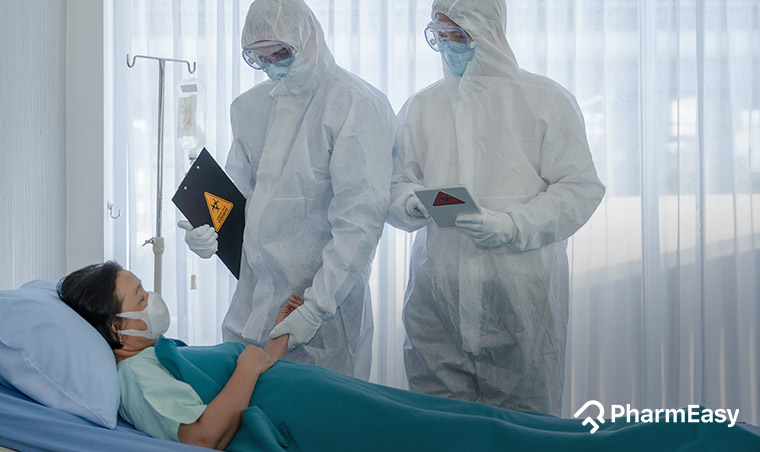How to Decide If a COVID Patient Needs Hospitalization?
By Priya Mewada +2 more

Get more insightful and
helpful tips to
treat Diabetes for FREE



Download PharmEasy App




Register to Avail the Offer
Send OTPBy continuing, you agree with our Privacy Policy and Terms and Conditions
By Priya Mewada +2 more
India is in the grips of the second wave of COVID-19. There has been a steady upsurge in the number of COVID cases in India since February 2021. And of late, India has been registering more COVID-19 positive results than last year.

Naturally, people are scared. But at a time of crisis, there are two things we all need to do.
1. Strictly follow COVID protocol. 2. Don’t panic.
Despite observing precautions, there is a possibility that people may contract the disease because others haven’t been cautious. In such cases, family members and patients themselves need to stay calm and make sensible decisions. The first question that pops to mind when someone in the family contracts COVID is this – do they need to be hospitalized? Let us address this question.
Table of Contents
Remember, not all COVID patients need to be admitted into a hospital. In fact, only a few people who test positive actually need hospitalization.
80 to 90% of patients have mild symptoms that can be treated at home under a doctor’s guidance. Once anyone shows any symptoms, they shouldn’t delay or deny or self-diagnose and should consult a doctor. In COVID, the first 3 to 5 days are very crucial. The earlier the treatment begins the better it is. If your family decides to treat you at home then follow all instructions and take all medicines as advised. Here are a few parameters to help you decide when home-care should end and patient needs hospitalization or medical supervision:
Oxygen saturation refers to the volume of oxygen present in your blood. This oxygen is transported to different parts of your body through blood so that your cells can function. Your SpO2 level should always be 95% or higher. If the COVID-19 patient’s SpO2 drops below 93%, then he/she will require immediate medical care.
Read about Oxygen Concentrators And How AreThey Helping The COVID-19 Patients.
Fever is not just a common COVID-19 symptom but it accompanies infection. In fact, a fever indicates that your body is fighting the disease. But if the body temperature reaches 101 Fahrenheit and refuses to subside for nearly 5 days, the person should be taken to a hospital.
Any dip in saturation below 92 please hospitalise, as this occurs way before breathlessness and is an early sign.
Dr. M.G. Kartheeka, MBBS, MD
If Breathlessness is observed in a COVID-19 patient, he/she shall require hospitalization.
In case of mental confusion, the person shall require hospitalization.
If this occurs, immediate medical attention is needed.
A covid patient should ideally be housed in a separate room in a hospital. If that’s a challenge then the distance between two beds should be at least 3 feet.
Dr. Ashish Bajaj, M.B.B.S., M.D.
When a senior citizen contracts COVID-19, it is best to consult a doctor on whether he/she needs hospitalization. Even so, not all COVID-positive senior citizens need to recuperate in a hospital. Those suffering from chronic diseases like diabetes and high blood pressure should be cautious. The family doctor who is familiar with the person’s health history should take the call on this.
If a person does not have any of the above, then that person can tide over COVID at home under medical guidance from his doctor. It is advised to only follow your doctor’s advice, be in constant touch with your doctor, keep informing him/her of your temperature, oxygen levels and overall status. With the support of family, good nutrition, adequate rest, hydration and medications, the majority of people are recovering at home with help from their doctors.
Rushing every COVID-19 patient to the hospital even when the person does not require hospitalization, will only bog down a system that is already reeling under the weight of a record number of COVID hospitalizations. This way, you could actually deprive very ill people of the emergency care that they need. Speak with your doctor and proceed accordingly.
Follow the COVID protocols to avoid any complications and get yourself regularly tested.

Disclaimer: The information provided here is for educational/awareness purposes only and is not intended to be a substitute for medical treatment by a healthcare professional and should not be relied upon to diagnose or treat any medical condition. The reader should consult a registered medical practitioner to determine the appropriateness of the information and before consuming any medication. PharmEasy does not provide any guarantee or warranty (express or implied) regarding the accuracy, adequacy, completeness, legality, reliability or usefulness of the information; and disclaims any liability arising thereof.
Links and product recommendations in the information provided here are advertisements of third-party products available on the website. PharmEasy does not make any representation on the accuracy or suitability of such products/services. Advertisements do not influence the editorial decisions or content. The information in this blog is subject to change without notice. The authors and administrators reserve the right to modify, add, or remove content without notification. It is your responsibility to review this disclaimer regularly for any changes.
Comments